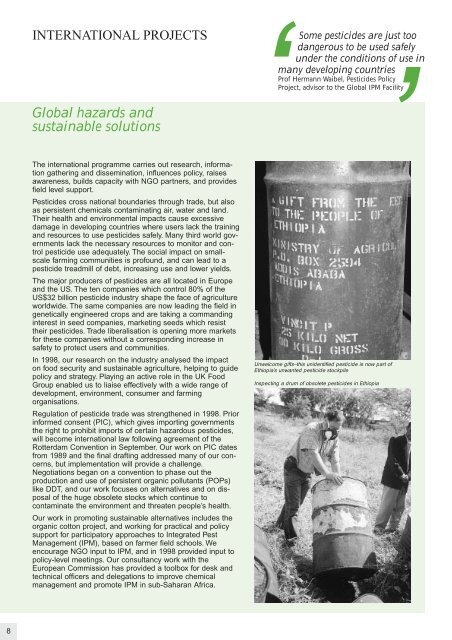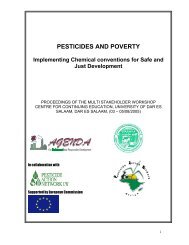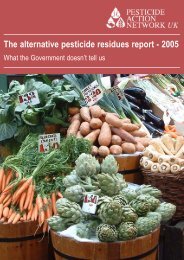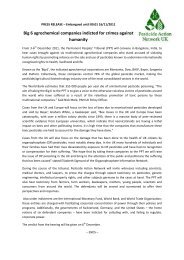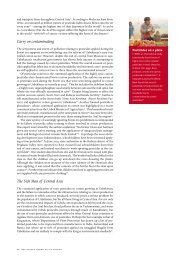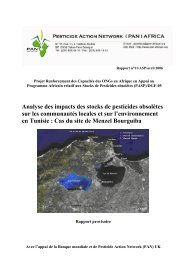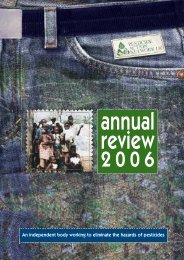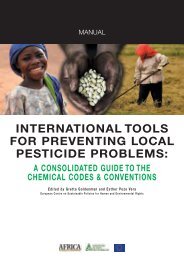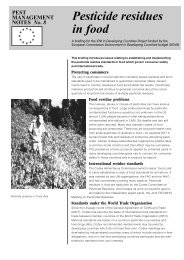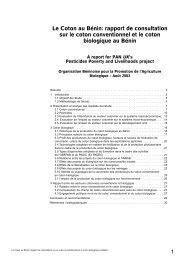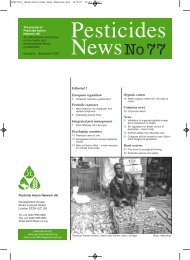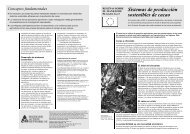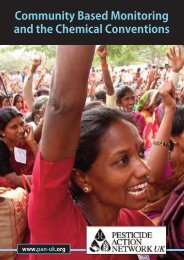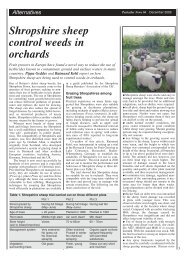PDF 313 KB - Pesticide Action Network UK
PDF 313 KB - Pesticide Action Network UK
PDF 313 KB - Pesticide Action Network UK
Create successful ePaper yourself
Turn your PDF publications into a flip-book with our unique Google optimized e-Paper software.
INTERNATIONAL PROJECTS<br />
Global hazards and<br />
sustainable solutions<br />
‘<br />
Some pesticides are just too<br />
dangerous to be used safely<br />
under the conditions of use<br />
’<br />
in<br />
many developing countries<br />
Prof Hermann Waibel, <strong>Pesticide</strong>s Policy<br />
Project, advisor to the Global IPM Facility<br />
The international programme carries out research, information<br />
gathering and dissemination, influences policy, raises<br />
awareness, builds capacity with NGO partners, and provides<br />
field level support.<br />
<strong>Pesticide</strong>s cross national boundaries through trade, but also<br />
as persistent chemicals contaminating air, water and land.<br />
Their health and environmental impacts cause excessive<br />
damage in developing countries where users lack the training<br />
and resources to use pesticides safely. Many third world governments<br />
lack the necessary resources to monitor and control<br />
pesticide use adequately. The social impact on smallscale<br />
farming communities is profound, and can lead to a<br />
pesticide treadmill of debt, increasing use and lower yields.<br />
The major producers of pesticides are all located in Europe<br />
and the US. The ten companies which control 80% of the<br />
US$32 billion pesticide industry shape the face of agriculture<br />
worldwide. The same companies are now leading the field in<br />
genetically engineered crops and are taking a commanding<br />
interest in seed companies, marketing seeds which resist<br />
their pesticides. Trade liberalisation is opening more markets<br />
for these companies without a corresponding increase in<br />
safety to protect users and communities.<br />
In 1998, our research on the industry analysed the impact<br />
on food security and sustainable agriculture, helping to guide<br />
policy and strategy. Playing an active role in the <strong>UK</strong> Food<br />
Group enabled us to liaise effectively with a wide range of<br />
development, environment, consumer and farming<br />
organisations.<br />
Regulation of pesticide trade was strengthened in 1998. Prior<br />
informed consent (PIC), which gives importing governments<br />
the right to prohibit imports of certain hazardous pesticides,<br />
will become international law following agreement of the<br />
Rotterdam Convention in September. Our work on PIC dates<br />
from 1989 and the final drafting addressed many of our concerns,<br />
but implementation will provide a challenge.<br />
Negotiations began on a convention to phase out the<br />
production and use of persistent organic pollutants (POPs)<br />
like DDT, and our work focuses on alternatives and on disposal<br />
of the huge obsolete stocks which continue to<br />
contaminate the environment and threaten people’s health.<br />
Our work in promoting sustainable alternatives includes the<br />
organic cotton project, and working for practical and policy<br />
support for participatory approaches to Integrated Pest<br />
Management (IPM), based on farmer field schools. We<br />
encourage NGO input to IPM, and in 1998 provided input to<br />
policy-level meetings. Our consultancy work with the<br />
European Commission has provided a toolbox for desk and<br />
technical officers and delegations to improve chemical<br />
management and promote IPM in sub-Saharan Africa.<br />
Unwelcome gifts–this unidentified pesticide is now part of<br />
Ethiopia’s unwanted pesticide stockpile<br />
Inspecting a drum of obsolete pesticides in Ethiopia<br />
8


